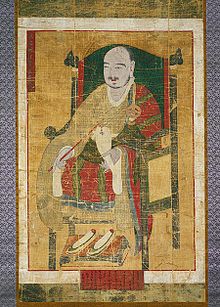Hyujeong
| Hyujeong 휴정 休靜1520-1604) |
|
|---|---|
 |
|
| School | Korean Seon |
| Other names | Seosan Daesa |
| Personal | |
| Born | 1520 Joseon |
| Died | January 23, 1604 |
| Senior posting | |
| Title | Dae Seonsa (Great Seon Master) |
| Religious career | |
| Students | Yujeong, Pyeongyang Eongi (平壤彦機) |
Little is known of the early life of the Korean Seon master Hyujeong (Hangul: 휴정; Hanja: 休靜, 1520-1604), also called Seosan Daesa (서산대사, 西山大師), other than that he was born in 1520 and that he became a monk. As was common for monks in this time, he travelled from place to place, living in a succession of monasteries. Buddhist monks had been forced to keep a low profile since General Yi Seonggye had been forced to eject Buddhism from its state of total permeation of government in order to gain the support of Neo-Confucian scholar-officials to consolidate his position against his Buddhist political opponents when he overthrew Gongyang of Goryeo in 1392 to become King Taejo of Joseon.
Before ever having tested his hand as a military commander, Hyujeong was a first-rate Seon master and the author of a number of important religious texts, the most important of which is probably his Seongagwigam (Hangul: 선가귀감; Hanja: 禪家龜鑑), a guide to Seon practice studied by Korean monks even today. Like most monks of the Joseon period, Hyujeong had been initially educated in Neo-Confucian philosophy. Dissatisfied, though, he wandered through the mountain monasteries. Later, after making a name for himself as a teacher, he was made arbiter of the Seon school by Myeongjong of Joseon, who was sympathetic towards Buddhism. He soon resigned from this responsibility, though, returning to the itinerant life, advancing his Seon studies and teaching at monasteries all around Korea.
At the beginning of the 1590s, Toyotomi Hideyoshi, after stabilising Sengoku-era Japan under his Shogunate, made preparations for a large-scale invasion of Joseon. Joseon was unaware and was unprepared for the Japanese invasion. In 1592, after Japan’s request for aid conquering Ming China was rebuffed, approximately 200,000 Japanese soldiers invaded Joseon, and the Japanese invasions of Korea (1592–98) began.
...
Wikipedia
